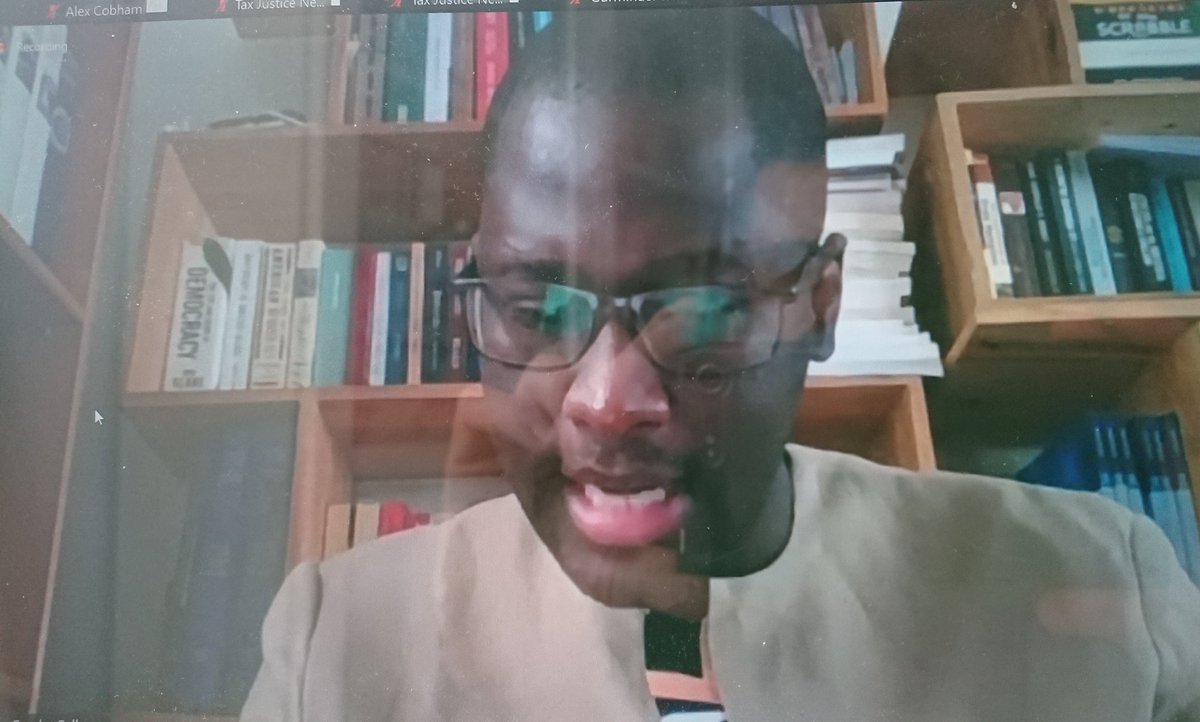
History faces forwards as well as backwards. As we prepare for the second day of our #ImperialInequalities conference today, and our new @FPCThinkTank
piece is published, I've blogged on whether and how the UK could move beyond its imperial legacies
taxjustice.net/2020/12/04/the…
piece is published, I've blogged on whether and how the UK could move beyond its imperial legacies
taxjustice.net/2020/12/04/the…
Registration for day 2 of #ImperialInequalities is still open, and the events get underway in just over three hours
https://twitter.com/TaxJusticeNet/status/1334553772350115840?s=19
Dr Ndongo Samba Sylla @nssylla opens day 2 of #ImperialInequalities, with a keynote on 'Colonial macroeconomics: Then and now' in which he highlights the commonality between imperial approaches and contemporary economic policies 

Fantastic keynote and Q&A, thank you @nssylla! So much ground covered. We're now into today's first panel of #ImperialInequalities, moderated by @JuliaMcClure_, with @LylaALatif presenting on ‘The Lure of the Welfare State following Decolonisation in Kenya’ 

Sorry for the tweet break - my presentation on 'Zamindari Empire? Extracting the Right to Statehood', outlining the development of the UK's dependent territories into a tax haven network both colonially exploited and exploiting...
https://twitter.com/TaxJusticeNet/status/1334850933910609924?s=20#ImperialInequalities
Two more great presentations in between, including @GKBhambra on the contradictions and confusions over who should be eligible for welfare: 'Imperial Revenue and National Welfare: The Case of Britain’'
https://twitter.com/TaxJusticeNet/status/1334857010718924802?s=20
...and @paulrgilbert on ‘The Crown Agents & the CDC Group: Taxation and the Colonial Roots of Development’s ‘Private Sector Turn’ - a cracking dissemination of the imperial legacies underpinning UK institutions and 'aid' approaches today
Last panel in the session is a fascinating one from @_ClairQuentin, on ‘Corporations, comity and the ‘revenue rule’: a jurisprudence of offshore’ - giving an insight into the role of company law developments in creating 'offshore'
Greta Q&A again, ranging from the way that Scandinavian moves greater gender equality were themselves a result of immigrationist colonialism, to the prospects for recovering African socialism models in Kenya and elsewhere - a privilege to be part of. #ImperialInequalities
Into the next #ImperialInequalities panel, on ‘Reparations policy and narratives: proposals for addressing
colonial injustices through taxation’, moderated by @zilhen. First up, philosopher @ArianneShahvisi arguing for citizenship rights for refugees, as a form of #reparations
colonial injustices through taxation’, moderated by @zilhen. First up, philosopher @ArianneShahvisi arguing for citizenship rights for refugees, as a form of #reparations

Posting @ArianneShahvisi's conclusions here too - should we consider citizenship for newborn refugees as a major means of reparation? #ImperialInequalities 

Switching gears now at #ImperialInequalities , to focus on international tax. @brooklyntaxprof starts with a parallel between international postage costs in 1845, and the principles of digital tax today... 

...and @brooklyntaxprof develops an analysis of the US basis to resist international focus of tax measures on the digital sector, finishing with the tempting prospect of the OECD's failure to deliver reforms leading to a new, better forum #ImperialInequalities
Next speaker is Kyle Willmott (U. Alberta), looking through the other end of the tax/empire telescope, at ‘Decolonizing tax: how settler colonialism is enacted through “taxpayer
citizenship” and the construction of “taxpayer” interests in the Canadian context’
citizenship” and the construction of “taxpayer” interests in the Canadian context’

Kyle Willmott (a sociologist, I should have said - the variety of this panel, like the whole conference, is fantastic) lays out the use of tax as an instrument of attack on the legitimate citizenship of indigenous peoples - who might see tax as paying for their own settlement 

John P. Moketo of the Zimbabwe Coalition on Debt and Development argues that the Zimbabwean tax system was designed to perpetuate gender inequalities and the racial inequalities that resulted from empire in his paper #ImperialInequalities 

'In gender-responsive budgeting, there is an imperative to bridge the divide of gender and race' - John Moketo wrapping up his talk at #ImperialInequalities, with a cracking slide 

Last paper of this #ImperialInequalities session: @KevalBharadia on the revolutionary change necessary for the global justice we need 

Into the final #ImperialInequalities policy panel, moderated by @Naomi_Fowler, and the first speaker is Esther Stanford-Xosei @Xosei of Pan-Afrikan Reparations Coalition in Europe - on the history and present of the fight for reparations, and self-determination for Black people 

The second speaker is Rev Dr Peter Cruchley of the Council for World Mission, which has conducted an important legacies of slavery project looking into the organisation's founder and origins - 'to share with you our shame, and also our outrage' #ImperialInequalities 

Further contributions from @KevalBharadia, linking his FTT proposal explicitly to reparations; and now @lukka_priya highlighting how although the world has changed in 2020, the power structures that embed #ImperialInequalities remain untouched 

And - we're done. #ImperialInequalities comes to a close. Thanks to everyone who spoke, moderated, raised questions, and otherwise joined the discussion; and to @GKBhambra and @JuliaMcClure_ whose edited volume was the catalyst, and the amazing team @TaxJusticeNet who made it fly
Also now...
• • •
Missing some Tweet in this thread? You can try to
force a refresh





